| Srl | Item |
| 1 |
ID:
155156
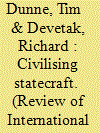

|
|
|
|
|
| Summary/Abstract |
In this contribution to the forum marking the publication of Andrew Linklater’s remarkable book on Violence and Civilization in the Western States-Systems we first locate the book in the context of Linklater’s overarching intellectual journey. While best known for his contribution to a critical international theory, it is through his engagement with Martin Wight’s comparative sociology of states-systems that Linklater found resonances with the work of process sociologist, Norbert Elias. Integrating Wight’s insights into the states-system with Elias’s insights into civilising processes, Violence and Civilization presents a high-level theoretical synthesis with the aim of historically tracing restraints on violence. The article identifies a tension between the cosmopolitan philosophical history which underpins the argument of the book, and which has underpinned all Linklater’s previous works, and the ‘Utrecht Enlightenment’ that offers a conception of ‘civilized statecraft’ at odds with a universal conception of morality and justice. The article then examines Linklater’s argument about the ‘global civilizing process’ as it applies to post-Second World War efforts to build greater institutional capability to protect peoples from harm. It is argued that Linklater over-estimates the extent to which solidarism has civilised international society, and that the extension of state responsibilities and development of civilised statecraft owe more to pluralism than solidarism.
|
|
|
|
|
|
|
|
|
|
|
|
|
|
|
|
| 2 |
ID:
092042
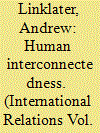

|
|
|
|
|
| Publication |
2009.
|
| Summary/Abstract |
Kenneth Waltz's structural realism abstracts the international political domain from other spheres of social interaction to explain recurrent patterns of competition and conflict across the millennia. There are similarities between the structural realist 'grand narrative' and the process-sociological approach developed by Norbert Elias. But the latter supported 'high-level synthesis' in the social sciences in order to understand how relations between material, ideational and emotional forces have contributed to the growth of human interconnectedness. The analysis contended that one of the purposes of the social sciences is to increase knowledge of how humans can gain control of the processes that bind them together in global networks of interdependence. Elias was opposed to partisan inquiry such as Kant's notion of a universal history with a cosmopolitan intent. But a shared emphasis on how humans have developed the capacity to cause distant harm reveals how future grand narratives can combine the analysis of the growth of interconnectedness with the ethical argument for greater transnational solidarity.
|
|
|
|
|
|
|
|
|
|
|
|
|
|
|
|
| 3 |
ID:
155154
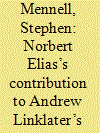

|
|
|
|
|
| Summary/Abstract |
Andrew Linklater’s projected trilogy of books for Cambridge University Press rests distinctively on the work of the sociologist Norbert Elias (1897–1990). Linklater is creating a powerful theoretical orientation for the field of International Relations by synthesising the ideas of Martin Wight and the ‘English School’ of IR with those of Elias. Though Elias is best known for his theory of civilising processes – on which Linklater draws most prominently – his writings are far more extensive. In particular, his sociological theory of knowledge and the sciences underlies Linklater’s recent writings, even if that is not immediately apparent on a cursory reading. This article spells out some of the ‘Eliasian infrastructure’ that may not be familiar to many of Linklater’s readers. It also discusses ways in which common misunderstandings of Elias’s ideas may lead to parallel misunderstandings of Linklater’s. The article concludes by asking whether, even if Linklater’s vision of the growth of ‘cosmopolitan responsibility’ may prove correct in the long term, we may nevertheless be experiencing something of a (possibly short-term) reversal towards ‘cosmopolitan irresponsibility’.
|
|
|
|
|
|
|
|
|
|
|
|
|
|
|
|
| 4 |
ID:
077216
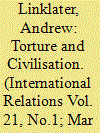

|
|
|
|
|
| Publication |
2007.
|
| Summary/Abstract |
The global anti-torture norm has been one of the main examples of a global civilising process. It refl ects modern sensibilities to cruelty and excessive force which were highlighted in Norbert Elias's account of the 'civilising process'. The idea of defending civilisation has also been used to defend torture in the war against terror. Exceptional methods are needed, it has been argued, to protect civilised ways of life. Notions of constitutional or 'civilised torture' have been introduced to try to harmonise these competing views. They have been employed in the attempt to reconcile civilised self-images with the use of excessive force. The future role of torture in the 'war against terror' depends on the interplay between these competing conceptions of the civilising process
|
|
|
|
|
|
|
|
|
|
|
|
|
|
|
|
| 5 |
ID:
155155
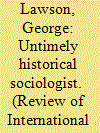

|
|
|
|
|
| Summary/Abstract |
This article examines the historical sociology that informs Andrew Linklater’s Violence and Civilization in the Western States-Systems. On the sociological side, it critically assesses Linklater’s use of Elias and Wight, arguing that his ‘higher level synthesis’ is internally incompatible. On the historical side, the article argues that the occlusion of the transnational interactions that, in great measure, drive historical development means that Linklater’s analysis is inadequate for its stated purpose: to chart the development of civilising processes within the Western state-systems.
|
|
|
|
|
|
|
|
|
|
|
|
|
|
|
|